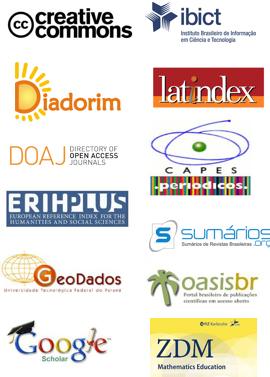Álgebra e Pensamento Algébrico: História e Implicações Educacionais
DOI:
https://doi.org/10.17921/2176-5634.2024v17n1p109-116Resumo
Este trabalho tem finalidade didática e o objetivo desta síntese da história da álgebra é percorrer o caminho da sua construção desde a antiguidade, destacando os avanços e recuos no seu desenvolvimento em decorrência da falta ou presença de outros elementos fundamentais que foram sendo construídos em paralelo, visando subsidiar professores de Matemática em seu trabalho de conquistar a atenção do estudante para essa ciência. Tem como meta estimular a busca por uma justificativa para a inclusão da história as álgebra no currículo da Educação Básica. O percurso desta síntese histórica vai da álgebra retórica à simbólica, dos motivos sociais às transcendentais, de Diofanto a al-Kowarismi, da álgebra geométrica dos gregos e da álgebra prática dos árabes à álgebra abstrata dos nossos dias. Apresenta-se os fatores econômicos intervenientes, o papel da álgebra clássica, a contribuição da álgebra moderna, o enigma histórico, o pensamento algébrico, o papel da álgebra na educação, a generalização da aritmética, o que é uma mente para a Matemática, a capacidade numérica e a capacidade matemática, o senso numérico e a algoritmização como fatores necessários à compreensão da álgebra. Trata-se, portanto, de uma revisão sistemática apoiada em autores que abordam a História da Matemática e discutem o papel desempenhado por ela ao longo dos séculos. O resultado aponta para a necessidade de uma maior discussão sobre a contribuição da álgebra para a constituição da mente matemática e para o desenvolvimento do pensamento algébrico.
Palavras-chave: Álgebra Retórica. Algarismo. Algoritmo. Al-Kowarismi.
Abstract
This work has didactic and the objective of this synthesis of the history of algebra is to follow the path of its construction since antiquity, highlighting the advances and setbacks in its development due to the lack or presence of other fundamental elements that were being built in parallel, aiming to subsidize Mathematics teachers in their work to gain student attention for this science. It aims to stimulate the search for a justification for its inclusion in the Basic Education curriculum. The route goes from rhetorical algebra to symbolic, from social to transcendental motives, from Diophantus to al-Kowarismi, from the geometric algebra of the Greeks and the practical algebra of the Arabs to the abstract algebra of our days. It presents the intervening economic factors, the role of classical algebra, the contribution of modern algebra, the historical enigma, algebraic thinking, the role of algebra in education, the generalization of arithmetic, what is a mind for mathematics, numerical ability and mathematical ability, number sense and algorithmization as necessary factors for understanding algebra. It is, therefore, a systematic review supported by authors who address the history of Mathematics and discuss the role played by it over the centuries. The result points to the need for a greater discussion about the contribution of algebra to the constitution of the mathematical mind and to the development of algebraic thinking.
Keywords: Rhetoric Algebra. Number. Algorithm. Al-Kowarismi.


